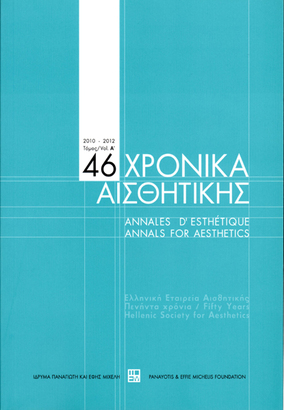Οι αρχαιοελληνικές αισθητικές αξίες στον 21ο αιώνα
Part of : Χρονικά αισθητικής : ετήσιον δελτίον της Ελληνικής Εταιρείας Αισθητικής ; Vol.41, No.Α, 2001, pages 117-125
Issue:
Pages:
117-125
Parallel Title:
Ancient greek aesthetic values in the 21st century
Section Title:
Ανακοινώσεις/papers/articles
Author:
Abstract:
The new century is the century of globalisation; its main characteristic is the effort made by the strongest and most powerful countries in the world for economic and technological development, not for the benefit of poorer countries, but for themselves. A second characteristic of globalization is that all humanistic ethical and aesthetic values have been neglected; so is the person (τό ατομον), the man (ό άνθρωπος), and the citizen (ό πολίτης).My syllogism is that our society is not sound and healthy. The only therapy is a return to the ancient Greek values of good (άγαθόν), moderation (μέτρον), virtue (άρετή) and isonomy (ισονομία).The European Union, in harmony with her historical scope, must energize Europeans to be not apathetic but energetic, not on the periphery but in the center of political problems, a basic Periclean political philosophy. Europeans must be myopic to the ephemeral eudaemonism of a technological paradise; for the psilosis from our psyche of the diachronic Hellenic ideas of meter, arête and autarkeia will be catastrophic.Hellas must be a protagonist, the omphalos and the epicentrum of new demiurgic theories, of a new ethical and aesthetic paideia, which will metamorphose European character.She must ostracise her lethargy and apathy and with her historical oestrus and enthusiasm, with the oxygen and the aroma of her ideas and her lexical treasure, enthrone in our psyche the idea of a new Europe with eurythmie organization, without xenophobia and xenelasia, but with xenial sympathy and philanthropy, with democratic polyphony and isonomy as her political stereotypes.
Subject:
Subject (LC):
Keywords:
κοινωνική ανθρωπολογία, αρχαία φιλοσοφία, Ελλάς
Notes:
The author has used words in English which are derived from Greek specifically in order to show their etymological roots




